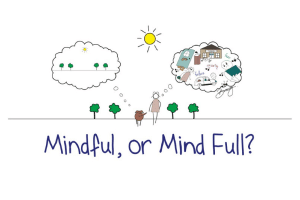People often say we need to be more mindful, present and in the moment but what does that really mean?
Mindfulness has been around for centuries stemming from Buddhist practices. More recently in the 1970s, Dr. Jon Kabat-Zinn took Mindfulness principles and developed the Mindfulness-Based Stress Reduction (MBSR) program through the University of Massachusetts. Since then Mindfulness has proven benefits for both our physical and mental health. According to the American Psychological Association, some of those benefits include the ability to better manage stress, increase memory, lessen emotional reactivity and increased immune functioning.[/fusion_text][fusion_text]
But what is Mindfulness?
[/fusion_text][fusion_text]Have you ever found yourself driving or walking somewhere, and when arriving at your destination, you can’t recall how you got there? We often find ourselves on autopilot, where we’re thinking about everything other than the present moment, what’s for dinner, plans for the weekend or recalling that earlier awkward conversation with your boss. We have been raised to multitask, do more with less time, etc. When we are consumed with thoughts about tomorrow and yesterday, we lose sight of the present moment.
Mindfulness means purposely staying in the moment, increasing our awareness of our surrounding environment, our body and thoughts without judgement. Mindfulness helps us to stay present rather than getting caught up in the past and future that often triggers rumination and stress. By being more mindful, we increase our awareness of our thoughts, feelings, and body so we become more attuned and better able to respond to stressors.
But what is Mindfulness?
[/fusion_text][imageframe lightbox=”no” gallery_id=”” lightbox_image=”” style_type=”glow” hover_type=”none” bordercolor=”” bordersize=”4px” borderradius=”4″ stylecolor=”” align=”left” link=”” linktarget=”_self” animation_type=”0″ animation_direction=”down” animation_speed=”0.1″ animation_offset=”” hide_on_mobile=”no” class=”” id=””] [/imageframe][separator style_type=”none” top_margin=”” bottom_margin=”” sep_color=”” border_size=”” icon=”” icon_circle=”” icon_circle_color=”” width=”” alignment=”” class=”” id=””][fusion_text]Being Mindful is possible at any moment, whether it’s taking a few minutes to focus on your breath, eating your meal and focusing on how it tastes, feels and smells, or completing a body scan. Mindfulness takes practice, and it’s recommended you practice daily- a recent study found that after 8 weeks of daily practice, participants of the study reported a sense of increased clarity and MRIs showed a decrease in gray matter in the brain associated with stress and anxiety.
[/imageframe][separator style_type=”none” top_margin=”” bottom_margin=”” sep_color=”” border_size=”” icon=”” icon_circle=”” icon_circle_color=”” width=”” alignment=”” class=”” id=””][fusion_text]Being Mindful is possible at any moment, whether it’s taking a few minutes to focus on your breath, eating your meal and focusing on how it tastes, feels and smells, or completing a body scan. Mindfulness takes practice, and it’s recommended you practice daily- a recent study found that after 8 weeks of daily practice, participants of the study reported a sense of increased clarity and MRIs showed a decrease in gray matter in the brain associated with stress and anxiety.
Here is an easy 7- minute breathing mindful exercise you can practice daily:
Sit comfortably with a long, straight spine and find a slow, oceanic breath. Begin counting your inhales and exhales from one to ten (inhale one, exhale one; inhale two, exhale two; etc.). When you reach ten, start again but count backwards to one. Repeat this cycle five times. When you’ve completed five cycles of breath-counting, simply continue to breathe at this calm, steady pace, for two-to-three minutes, visualizing the breath moving through the respiratory system and appreciating its physical relationship with the body.
For other mindfulness exercises, click here. If interested in learning more about Mindfulness and speaking to a professional book an appointment with our resident therapist. Psychotherapy and Counselling services are available at Bronte Wellness Boutique.
[/fusion_text]

